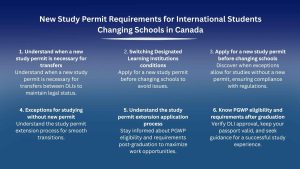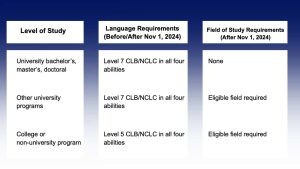Canada’s Updated 2025 Study Permit Rules for School Transfers

Introduction
As of May 1, 2025, international students in Canada face stricter requirements for transferring between schools, particularly at the post-secondary level. Announced by Immigration, Refugees and Citizenship Canada (IRCC) on November 8, 2024, these rules mandate that most students obtain a new study permit before switching to a new Designated Learning Institution (DLI). The policy, fully after interim measures ended on April 30, 2025, aims to ensure students attend approved institutions, maintain legal status, and address concerns about program integrity. This article outlines the requirements, exceptions, application process, and broader implications for students.
Background and Context
Canada remains a top destination for international students, but recent challenges, including housing shortages and strained services, have prompted reforms. Some institutions increased international student intakes for revenue, leading to oversight concerns. In response, the government introduced a 2024 study permit cap of 360,000, followed by a 2025 cap of 550,162. The new transfer rules, effective May 1, 2025, align with these efforts to regulate student mobility, protect students from unaccredited schools, and ensure compliance with immigration laws. While the policy enhances accountability, it has raised concerns about added complexity for students seeking academic flexibility.
General Requirement
Most international students must now apply for and receive a new study permit before transferring to a different DLI at the post-secondary level. This replaces the pre-November 2024 process, which allowed students to update their DLI via their IRCC online account. The new requirement ensures enrollment at approved DLIs and compliance with permit conditions.

When a New Study Permit is Required
The following scenarios typically require a new study permit:
- Changing DLIs at the post-secondary level: Transferring from one university or college to another.
- Moving from secondary to post-secondary education: Transitioning from high school to a college or university.
- Moving from post-secondary to secondary education: Switching from a university to a high school program.
- Changing schools in Quebec: Often requires a new Certificate of Acceptance of Quebec (CAQ), as outlined by the Ministère de l’Immigration.
- Repeated DLI changes: Students who changed DLIs before November 8, 2024, and wish to transfer again must apply for a new permit.
- If a student’s study permit application is in progress and they wish to change DLIs, they must submit a new LOA and Proof of Acceptance of Letter of Acceptance (PAL) or Temporary Authorization Letter (TAL) via the IRCC web form.
When a New Study Permit is Not Required
Certain scenarios allow students to continue with their existing permit:
- Changing programs within the same DLI at the post-secondary level: No new permit is needed if permit conditions are met, though a new PAL/TAL may be required as of January 22, 2025.
- Changing schools at primary or secondary levels: If the permit is valid and has no restrictive conditions, no new permit is required.
- Moving from primary to secondary within the same DLI: Students can continue with their existing permit if it remains valid.
Exceptions for Early Transfer
During the Winter/Spring 2025 intake (January 1 to May 1, 2025), students could start studying at a new DLI before receiving their new study permit under specific conditions:
- Acceptance to the new DLI for the Winter/Spring 2025 term.
- Application for a study permit extension submitted.
- Valid current study permit without the new DLI’s name.
- Compliance with all conditions of the previous permit.
- Continuous residence in Canada since receiving the new LOA.
- Previous DLI closed, discontinued the program, was on the government suspension list, or lost designated status.
- These interim measures, noted in CIC News, eased the transition to the new rules.
Application Process
To transfer schools, students must apply for a study permit extension through the IRCC website. The process includes:
👉 Required Documents
- Application form (IMM 5709).
- Photocopies of relevant passport pages and current study permit.
- New Letter of Acceptance (LOA) from a DLI on the DLI list.
- Valid PAL/TAL (required as of January 22, 2025, unless exempt).
- Proof of financial support and academic standing.
- Additional documents per the IRCC checklist.
👉 Fees
- Study permit extension: $150.
- Biometrics (if required): $85 per person or $170 for families of two or more.
- Restoration of status (if applicable): $389.75 ($239.75 restoration + $150 permit).
👉 Timing
Apply at least 30 days before the current permit expires or as soon as possible when planning a transfer. Processing times vary due to the 2025 study permit cap. Students outside Canada with an approved permit must submit a new application with a new LOA and pay all fees.
Consequences of Non-Compliance
Failing to obtain a new study permit when required can lead to:
- Invalidation of the current study permit.
- Permit cancellation, potentially resulting in removal from Canada.
- Difficulties obtaining future study or work permits.
- Schools reporting unregistered students, triggering immigration enforcement.
- A study permit becomes invalid 90 days after completing secondary studies if finished early, regardless of the expiry date, as noted in IRCC guidelines.
Impact on Post-Graduation Work Permit (PGWP) Eligibility
The new rules may affect eligibility for a Post-Graduation Work Permit (PGWP), which allows graduates to work in Canada for up to three years. For applications after November 1, 2024, PGWP eligibility may require graduating from an eligible field of study, as reported by CIC News.
PGWP Eligibility Requirements

Special Considerations for Quebec
In Quebec, students must comply with provincial requirements. For vocational training centers (VTCs), a new CAQ is needed without a new study permit. For other institutions, both a new study permit and CAQ attestation are required. Contact the Ministère de l’Immigration for guidance.
Additional Notes
DLI Verification: Confirm the new school is on the DLI list and not on the suspension list.
Passport Validity: A study permit extension is valid only for the duration of the passport’s validity.
Co-op Programs: A new co-op work permit is required for co-op programs at a different school.
Support: Consult school advisors or legal experts for assistance, as suggested by VisaVerge.
Policy Debate
The policy has sparked mixed reactions. Proponents argue it strengthens oversight, ensuring students attend reputable institutions and reducing strain on public resources. Critics, including some student advocates, contend it adds bureaucratic hurdles, potentially discouraging academic mobility and affecting students’ ability to find suitable programs. The 2025 permit cap further complicates timely approvals, raising concerns about accessibility.
Conclusion
The new study permit requirements, effective May 1, 2025, reflect Canada’s efforts to better regulate its international student program while protecting students and public resources. Although the rules introduce additional complexity, careful planning and adherence to IRCC guidelines can help ensure a smooth transfer process.
Students are encouraged to verify their new DLI’s status, apply early, and regularly consult official resources like Canada.ca to stay compliant and on track with their academic goals.
If you need help navigating these changes or preparing your application, contact our team at Grow Graduate Canada. We’re here to assist you with personalized guidance, accurate information, and reliable support at every step.